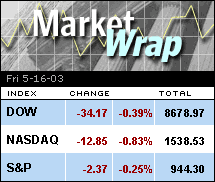NEW YORK (CNN/Money) -
Signs of weakness in the economy pushed stocks lower Friday, putting a mildly negative end to an otherwise positive week, in which markets mostly consolidated gains after the previous week's rally.

The major indexes all ended the day lower. The Nasdaq composite (down 12.85 to 1538.53, Charts) traded down all day on technology weakness, while the Dow Jones industrial average (down 34.17 to 8678.97, Charts) and the S&P 500 index (down 2.37 to 944.30, Charts) lacked direction throughout much of the session.
For the week, the Nasdaq rose 1.21 percent, the Dow rose 0.86 percent, and the S&P 500 rose 1.17 percent, largely due to a strong run up on Monday. It was the Dow's fourth up week out of five, and the fifth-straight weekly gain for both the Nasdaq and S&P.
Stocks rallied sharply Monday, consolidated those gains Tuesday and Wednesday, rose again more modestly Thursday and then dipped a little Friday.
The week's heavy slate of economic reports showed mostly ambiguous results, having only a muted impact on investor sentiment.
Friday morning's consumer prices report was perhaps an exception. The Consumer Price Index -- in conjunction with Thursday's producer prices report -- sparked concerns about the potential for steeper stock losses in the weeks ahead should deflation fears accelerate.

"The stock market is on one side saying earnings and the economy are going to improve, while the bond market and the Fed and the recent economic data are on the other, saying: "Watch out for deflation." Clearly one side is wrong," said Ram Kolluri, chief investment officer at GlobalValue Investors. "The market wants to go up, but we need something to justify it. I suspect people may continue to take profits for some time."
Next week is fairly light on economic reports. Monday's index of leading indicators is forecast show some improvement, according to Reuters. Quarterly earnings are also expected from Hewlett-Packard (HPQ: up $0.32 to $17.95, Research, Estimates) and Home Depot (HD: down $0.18 to $29.19, Research, Estimates). Both are expected to show improvement from earnings a year earlier, according to First Call forecasts.
Consumer prices spark concerns
Highlighting the market's recent deflation fears, the Consumer Price Index fell 0.3 percent in April after a 0.3 percent rise the month before. What was even more worrisome was that the core index, which excludes relatively volatile food and energy prices, was flat for the second month in a row.
Coming on the back of a 1.9 percent decline in wholesale prices in April, the news reignited Wall Street's concern that deflation -- an environment of uncontrollable price declines -- could loom in the not-too-distant future.
Bonds have benefited from this, especially in the wake of the Federal Reserve's hints that it will keep interest rates low for a longer period of time and might even resort to buying Treasury debt. More and more people on Wall Street expect the Fed to lower interest rates at its next meeting at the end of June, some even betting on a bold half-percentage-point cut.
"On the day, you're just seeing traders take some profits in response to an overbought condition after the rally, but longer-term there is a real concern about the bond market being at a 45-year low and the risks of deflation," said Robert Philips, president and chief investment officer at Walnut Asset Management.

Back in the stock market, the day's positive economic news came in the form of a surprisingly high reading on the University of Michigan's index of consumer confidence. The index came in at 93.2 for May, well above forecasts. The release of the report caused a brief uptick on the Dow before concerns about deflation took the index down again.
Also weighing on the market's sentiment was the day's third important economic tidbit, a report that showed a 6.8 percent decline in housing starts in April. A robust housing market, together with the ever-spending U.S. consumer, has been one of the major supports for what meager strength the economy has shown in the past couple of years. Housing stocks declined following the report.
Dell's ho-hum outlook
In corporate news, Dell (DELL: down $0.99 to $31.19, Research, Estimates) dropped 3 percent after it disappointed Wall Street with its fiscal second-quarter revenue forecast. Still, the leading maker of personal computers showed earnings growth of 31 percent in its fiscal first quarter.
Also adding to the downtrend, the chip equipment book-to-bill ratio fell to 0.86 in April, below the 1.01 consensus forecast. Applied Materials (AMAT: down $0.58 to $14.31, Research, Estimates) lost nearly 4 percent.
Light sweet crude oil futures rose 32 cents to $29.06 a barrel in New York. Gold rallied $2.10 to $354.90 an ounce in New York.
Bond yields continued to fall. The 10-year note added 30/32 of a point in price, pushing its yield down to 3.42 percent, yet another 45-year low.
The dollar fell against major currencies, giving in after a modest show of resilience versus the euro over the last few sessions on the heels of hitting new four-year lows against the European currency last week.
Market breadth was mixed and volume was lighter than it has been for most of the week. Advancers edged decliners on the New York Stock Exchange, while losers edged winners nine to seven on the Nasdaq. Some 1.48 billion shares traded on the NYSE and 1.74 billion shares changed hands on the Nasdaq.

|

